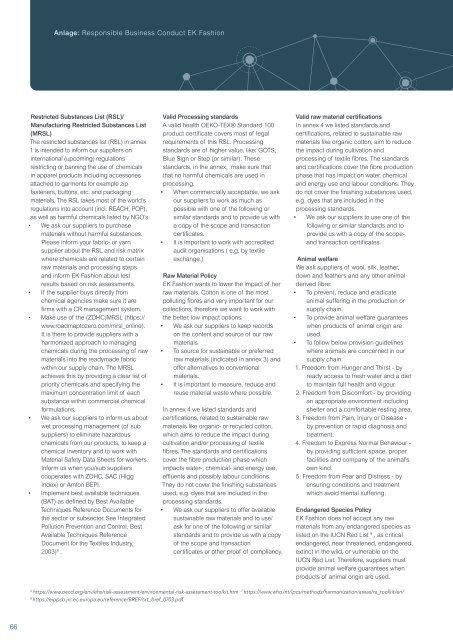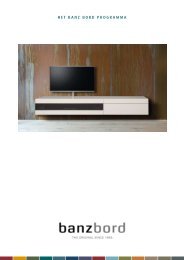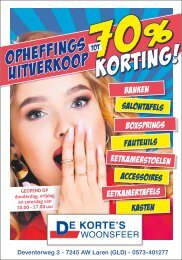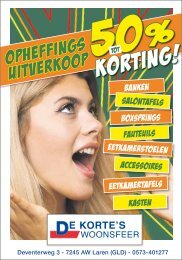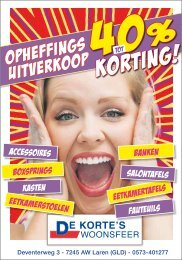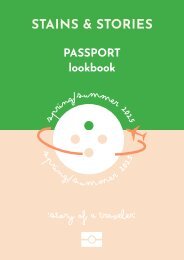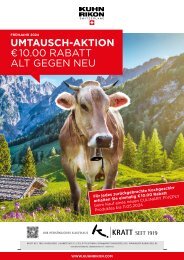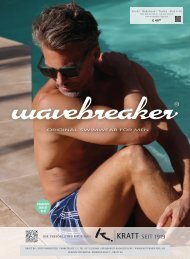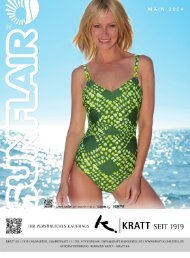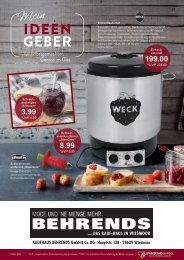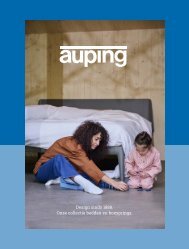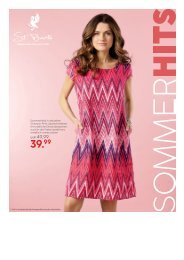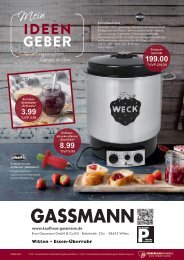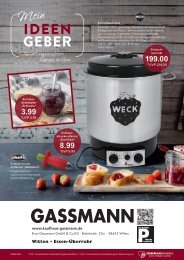EK Fashion ESG-Jahresbericht 2021
EK Fashion ESG-Jahresbericht 2021
EK Fashion ESG-Jahresbericht 2021
Erfolgreiche ePaper selbst erstellen
Machen Sie aus Ihren PDF Publikationen ein blätterbares Flipbook mit unserer einzigartigen Google optimierten e-Paper Software.
Anlage: Responsible Business Conduct <strong>EK</strong> <strong>Fashion</strong><br />
Restricted Substances List (RSL)/<br />
Manufacturing Restricted Substances List<br />
(MRSL)<br />
The restricted substances list (RSL) in annex<br />
1 is intended to inform our suppliers on<br />
international (upcoming) regulations<br />
restricting or banning the use of chemicals<br />
in apparel products including accessories<br />
attached to garments for example zip<br />
fasteners, buttons, etc. and packaging<br />
materials. The RSL takes most of the world’s<br />
regulations into account (incl. REACH, POP),<br />
as well as harmful chemicals listed by NGO’s.<br />
• We ask our suppliers to purchase<br />
materials without harmful substances.<br />
Please inform your fabric- or yarn<br />
supplier about the RSL and risk matrix<br />
where chemicals are related to certain<br />
raw materials and processing steps<br />
and inform <strong>EK</strong> <strong>Fashion</strong> about test<br />
results based on risk assessments.<br />
• If the supplier buys directly from<br />
chemical agencies make sure it are<br />
firms with a CR management system.<br />
• Make use of the (ZDHC)MRSL (https://<br />
www.roadmaptozero.com/mrsl_online).<br />
It is there to provide suppliers with a<br />
harmonized approach to managing<br />
chemicals during the processing of raw<br />
materials into the readymade fabric<br />
within our supply chain. The MRSL<br />
achieves this by providing a clear list of<br />
priority chemicals and specifying the<br />
maximum concentration limit of each<br />
substance within commercial chemical<br />
formulations.<br />
• We ask our suppliers to inform us about<br />
wet processing management (of sub<br />
suppliers) to eliminate hazardous<br />
chemicals from our products, to keep a<br />
chemical inventory and to work with<br />
Material Safety Data Sheets for workers.<br />
Inform us when you/sub suppliers<br />
cooperates with ZDHC, SAC (Higg<br />
Index) or Amfori BEPI.<br />
• Implement best available techniques<br />
(BAT) as defined by Best Available<br />
Techniques Reference Documents for<br />
the sector or subsector. See Integrated<br />
Pollution Prevention and Control, Best<br />
Available Techniques Reference<br />
Document for the Textiles Industry,<br />
2003) 8 .<br />
Valid Processing standards<br />
A valid health O<strong>EK</strong>O-TEX® Standard 100<br />
product certificate covers most of legal<br />
requirements of this RSL. Processing<br />
standards are of higher value, like: GOTS,<br />
Blue Sign or Step (or similar). These<br />
standards, in the annex, make sure that<br />
that no harmful chemicals are used in<br />
processing.<br />
• When commercially acceptable, we ask<br />
our suppliers to work as much as<br />
possible with one of the following or<br />
similar standards and to provide us with<br />
a copy of the scope and transaction<br />
certificates.<br />
• It is important to work with accredited<br />
audit organisations ( e.g. by textile<br />
exchange.)<br />
Raw Material Policy<br />
<strong>EK</strong> <strong>Fashion</strong> wants to lower the impact of her<br />
raw materials. Cotton is one of the most<br />
polluting fibres and very important for our<br />
collections, therefore we want to work with<br />
the better, low impact options.<br />
• We ask our suppliers to keep records<br />
on the content and source of our raw<br />
materials<br />
• To source for sustainable or preferred<br />
raw materials (indicated in annex 3) and<br />
offer alternatives to conventional<br />
materials.<br />
• It is important to measure, reduce and<br />
reuse material waste where possible.<br />
In annex 4 we listed standards and<br />
certifications, related to sustainable raw<br />
materials like organic- or recycled cotton,<br />
which aims to reduce the impact during<br />
cultivation and/or processing of textile<br />
fibres. The standards and certifications<br />
cover the fibre production phase which<br />
impacts water-, chemical- and energy use,<br />
effluents and possibly labour conditions.<br />
They do not cover the finishing substances<br />
used, e.g. dyes that are included in the<br />
processing standards.<br />
• We ask our suppliers to offer available<br />
sustainable raw materials and to use/<br />
ask for one of the following or similar<br />
standards and to provide us with a copy<br />
of the scope and transaction<br />
certificates or other proof of compliancy.<br />
Valid raw material certifications<br />
In annex 4 we listed standards and<br />
certifications, related to sustainable raw<br />
materials like organic cotton, aim to reduce<br />
the impact during cultivation and<br />
processing of textile fibres. The standards<br />
and certifications cover the fibre production<br />
phase that has impact on water, chemical<br />
and energy use and labour conditions. They<br />
do not cover the finishing substances used,<br />
e.g. dyes that are included in the<br />
processing standards.<br />
• We ask our suppliers to use one of the<br />
following or similar standards and to<br />
provide us with a copy of the scopeand<br />
transaction certificates.<br />
Animal welfare<br />
We ask suppliers of wool, silk, leather,<br />
down and feathers and any other animal<br />
derived fibre:<br />
• To prevent, reduce and eradicate<br />
animal suffering in the production or<br />
supply chain.<br />
• To provide animal welfare guarantees<br />
when products of animal origin are<br />
used.<br />
• To follow below provision guidelines<br />
where animals are concerned in our<br />
supply chain:<br />
1. Freedom from Hunger and Thirst - by<br />
ready access to fresh water and a diet<br />
to maintain full health and vigour.<br />
2. Freedom from Discomfort - by providing<br />
an appropriate environment including<br />
shelter and a comfortable resting area.<br />
3. Freedom from Pain, Injury or Disease -<br />
by prevention or rapid diagnosis and<br />
treatment.<br />
4. Freedom to Express Normal Behaviour -<br />
by providing sufficient space, proper<br />
facilities and company of the animal’s<br />
own kind.<br />
5. Freedom from Fear and Distress - by<br />
ensuring conditions and treatment<br />
which avoid mental suffering.<br />
Endangered Species Policy<br />
<strong>EK</strong> <strong>Fashion</strong> does not accept any raw<br />
materials from any endangered species as<br />
listed on the IUCN Red List 9 , as critical<br />
endangered, near threatened, endangered,<br />
extinct in the wild, or vulnerable on the<br />
IUCN Red List. Therefore, suppliers must<br />
provide animal welfare guarantees when<br />
products of animal origin are used.<br />
<strong>EK</strong> <strong>Fashion</strong> does not accept Real exotic<br />
animal skins (incl. snake, alligator, crocodile,<br />
lizard and ostrich).<br />
Fur -<strong>EK</strong> <strong>Fashion</strong> does not accept animal fur<br />
Silk - <strong>EK</strong> <strong>Fashion</strong> does not accept silk from<br />
moth that have been boiled alive.<br />
Animal hair (e.g. Cashmere, Angora,<br />
Mohair) - <strong>EK</strong> <strong>Fashion</strong> does NOT permit that<br />
hairs are collected from animals in an<br />
animal-unfriendly manner (see guideline<br />
above).<br />
• We ask our suppliers to provide a third<br />
party certificate that proofs good<br />
animal husbandry.<br />
Leather - Real leather and suede from<br />
sheep, pigs, goats and cattle reared for<br />
meat production & synthetic leather are<br />
accepted. All other leather variations are<br />
NOT permitted!<br />
• We prefer leather processed through<br />
facilities rate by Gold, Silver, Bronze by<br />
the Leather Working Group or facilities<br />
STeP by O<strong>EK</strong>O-TEX certified.<br />
Down Feathers Policy - <strong>EK</strong> <strong>Fashion</strong> does<br />
not accept Down/Feathers from live-plucked<br />
birds and from force fed birds. <strong>EK</strong> <strong>Fashion</strong><br />
only accepts Down/Feathers from meat<br />
production and prefers Down/Feathers that<br />
are certified to the Textile Exchange<br />
Responsible Down Standard.<br />
• Our business partners must submit a<br />
declaration or certificate guarantee that<br />
all Down filled garment/items are<br />
Non-live plucked down.<br />
Wool & Mulesing Policy - We endorse the<br />
IWTO- standards for animal welfare and<br />
demand that the Five Freedoms for Animal<br />
Welfare must be respected. Mulesing is a<br />
surgical procedure carried out on (mainly<br />
Merino) sheep to prevent flystrike.<br />
• <strong>EK</strong> <strong>Fashion</strong> only accepts wool from<br />
sheep that have not been mulesed and<br />
prefers wool that is certified to the textile<br />
Exchange Responsible Wool Standard.<br />
Recycled wool, certified according to<br />
the recycled wool standard could be a<br />
solution to prevent mulesing.<br />
Man-made Cellulosic Fibres Policy - <strong>EK</strong><br />
<strong>Fashion</strong> does not accept products (Viscose,<br />
Rayon, Modal and Lyocell) deriving from<br />
illegally logged sources, ancient and<br />
endangered forests, as listed in the IUCN<br />
Red list as critical endangered, near<br />
threatened, endangered, extinct in the wild,<br />
or vulnerable. <strong>EK</strong> <strong>Fashion</strong> prefers<br />
sustainably certified wood products (e.g.<br />
FSC)<br />
Packaging - Since plastic is nonbiodegradable,<br />
recycling is a part of<br />
global efforts to reduce plastic in the waste<br />
stream, especially the approximately eight<br />
million metric tonnes of waste plastic that<br />
enter the earth’s ocean every year. Soft<br />
Plastics are also recycled such as<br />
polyethylene film and bags.<br />
• We ask our supplier to actively research<br />
and offer options which are a better<br />
choice for the environment: Reusable,<br />
recycled and/or reduction of packing<br />
materials.<br />
Plastic - We ask our suppliers to use<br />
preferred plastics for our products and<br />
packaging like recycled plastics and<br />
biodegradable plastics (see GRS<br />
certification) of e.g. PLA (corn sugars).<br />
Cardboard - We ask our suppliers to use<br />
recycled or FSC/PEFC certified cardboard.<br />
We aim to only use cardboard and paper<br />
packaging which consists of 100%<br />
recycled paper fibre.<br />
Waste reduction - We ask our suppliers to<br />
reduce (raw) material wase as much as<br />
possible and preferably join a recycling<br />
program (packaging waste, material cutting<br />
waste etc.)<br />
3. Management System, Monitoring,<br />
documentation, verification<br />
The supplier company shall define and<br />
implement a management system to ensure<br />
that the requirements of the Responsible<br />
Business Conduct can be met.<br />
Management is responsible for the correct<br />
implementation and continuous<br />
improvement by taking corrective measures,<br />
as well as the communication of the<br />
requirements of the RBC to all employees<br />
and subcontractors. It shall also address<br />
employees’ concerns of non-compliance<br />
with this Code of Conduct. <strong>EK</strong> <strong>Fashion</strong> will<br />
be informed about non-compliances and<br />
follow up.<br />
• If the buying behaviour of <strong>EK</strong> <strong>Fashion</strong><br />
impacts the compliancy to this RBC we<br />
will be informed immediately.<br />
In our accompanied questionnaire we will<br />
ask you to provide us with sufficient<br />
information to prove the origin and<br />
sustainability of our products. If you have<br />
any questions please let us know.<br />
The requirements in the Responsible<br />
Business Conduct are requirements that we<br />
want to achieve together. These are our<br />
common goals. We are open for discussion<br />
if suppliers are not capable to meet these<br />
requirements. We are certain that many of<br />
our suppliers have even higher demands of<br />
themselves. Therefore, we want you to<br />
provide us with the relevant certifications<br />
and reports to confirm this. By signing this<br />
RBC statement, you commit yourself to it.<br />
The undersigned hereby confirms that:<br />
We have read the Responsible Business<br />
Conduct (RBC) and accept the terms<br />
required of us as suppliers and will inform<br />
and cooperate with our subcontractors and<br />
sub suppliers working on products of <strong>EK</strong><br />
<strong>Fashion</strong>. We will inform <strong>EK</strong> <strong>Fashion</strong> and<br />
discuss non- compliances and the issues<br />
involved in their product’s supply chain.<br />
6<br />
https://www.oecd.org/env/ehs/risk-assessment/environmental-risk-assessment-toolkit.htm 7 https://www.who.int/ipcs/methods/harmonization/areas/ra_toolkit/en/<br />
8<br />
https://eippcb.jrc.ec.europa.eu/reference/BREF/txt_bref_0703.pdf<br />
9<br />
IUCN Red List: Union for Conservation of Nature’s Red List of Threatened Species has evolved to become the world’s most comprehensive information source on<br />
the global conservation status of animal, fungi and plant species. See https://www.iucnredlist.org/<br />
66 67


